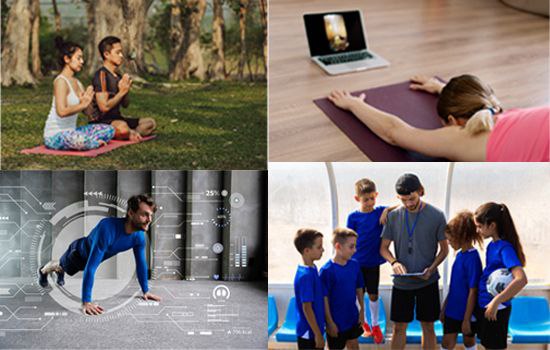
Physical education isn't just dodgeball and gym class anymore. In 2024, it's a dynamic field pulsating with innovative practices, In the ever-evolving landscape of education, the Master of Physical Education (M.P.Ed) is experiencing significant transformations. As we move into the future, several trends are reshaping the way physical education is approached at the postgraduate level. This blog explores the top five trends that are influencing the future of Master of Physical Education programs, providing insights into the latest developments and ensuring a comprehensive understanding of this dynamic field.
In the 21st century, technology has permeated every aspect of our lives, and education is no exception. Master of Physical Education programs are increasingly integrating technological tools to enhance the learning experience. Virtual reality (VR) and augmented reality (AR) are being utilized to simulate real-world scenarios, allowing students to practice and refine their teaching methods in a controlled digital environment. Additionally, fitness tracking devices and apps are becoming valuable tools for both educators and students, promoting a data-driven approach to physical fitness assessment.
By incorporating technology into the curriculum, M.P.Ed programs are preparing future physical education professionals to leverage cutting-edge tools that can positively impact the effectiveness of their teaching methods.
As the demand for expertise in sports-related fields continues to grow, Master of Physical Education programs are witnessing a trend towards specialization in sports science. This includes in-depth studies in areas such as biomechanics, sports nutrition, exercise physiology, and sports psychology. The aim is to produce graduates who not only possess a strong foundation in physical education but also have specialized knowledge that can be applied in various sports and fitness-related contexts.
This trend aligns with the evolving needs of the sports industry, where professionals with a multidisciplinary understanding of sports science are highly sought after. The integration of specialized courses within M.P.Ed programs ensures that graduates are well-equipped to address the diverse challenges in the field of physical education and sports.
Beyond traditional physical education, there is a growing recognition of the importance of health and wellness. M.P.Ed programs are adapting to this shift by incorporating courses that focus on holistic well-being, nutrition, and mental health. The emphasis is not only on physical fitness but also on cultivating a comprehensive understanding of overall health.
Educators in Master of Physical Education programs are exploring innovative approaches to promote healthy living, and students are encouraged to develop programs that address not only physical skills but also mental and emotional well-being. This trend reflects a broader societal awareness of the interconnectedness of physical and mental health, positioning M.P.Ed graduates as advocates for holistic wellness.
In an increasingly interconnected world, Master of Physical Education programs are recognizing the importance of global perspectives and cultural competence. The curriculum is evolving to include a more diverse range of sports and physical activities from around the globe. This not only enriches the educational experience for students but also prepares them to work in multicultural environments.
Cultural competence is becoming a crucial skill for physical education professionals, as they may find themselves working with diverse populations in various settings. The trend towards global perspectives ensures that M.P.Ed graduates are adaptable and capable of addressing the unique needs and preferences of individuals from different cultural backgrounds.
The traditional classroom setting is evolving, and Master of Physical Education programs are embracing online and blended learning formats. This trend allows greater flexibility for students, enabling them to pursue advanced degrees while balancing other commitments. Online platforms facilitate collaboration and networking among students from different geographical locations, creating a virtual community of aspiring physical education professionals.
Blended learning, which combines online and face-to-face instruction, offers a dynamic approach to education. It allows students to engage with course materials at their own pace while still benefiting from in-person interactions during practical sessions and hands-on experiences. This flexibility in learning formats ensures that M.P.Ed programs remain accessible to a diverse range of individuals, contributing to the democratization of education in the field.
In conclusion, the Master of Physical Education is undergoing a transformative phase, driven by technological advancements, a focus on specialization, holistic approaches to health and wellness, global perspectives, and flexible learning formats. As these trends continue to shape the future of M.P.Ed programs, educators and students alike must stay attuned to the evolving landscape of physical education. By embracing these changes, Master of Physical Education graduates will be well-prepared to navigate the complexities of the field and contribute meaningfully to the promotion of health, fitness, and overall well-being on a global scale.